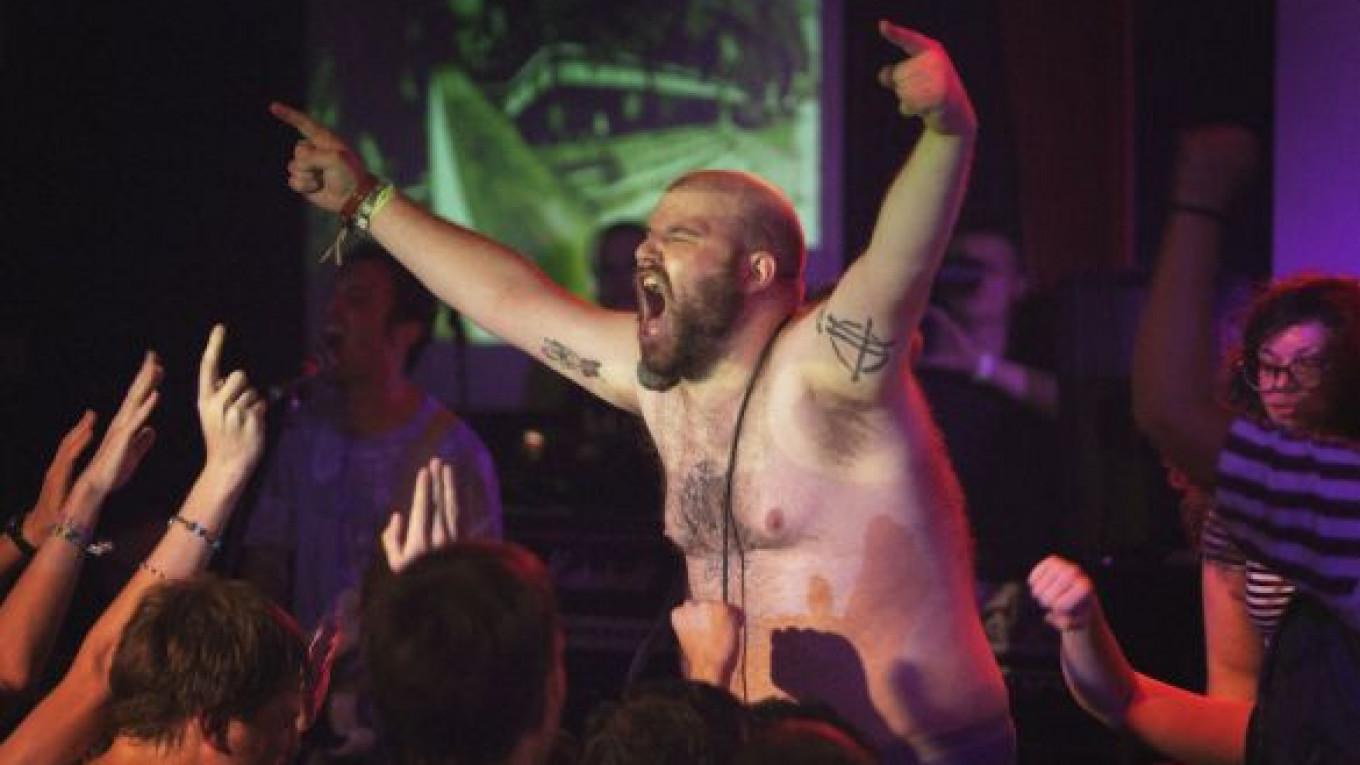Everybody who approaches Damian Abraham gets a warm smile and a meaty paw. “Hey, Damian, nice to meet you,” he says, even though he knows you’re there to see him, the giant, bearded lead singer of the hardcore punk band whose name is too rude to print in this newspaper.
Given such effusive friendliness, it’s hard imagine that this is the same man who, 30 minutes later, will be shirtless, sweating profusely and screaming incomprehensible lyrics between stage dives onto his adoring fans. Abraham didn’t slice up his forehead during this show, but when he does, the blood running down his face gives the false impression of a scary man unhinged.
The Canadian group, whose name rhymes with “lucked up,” played Sixteen Tons late last month as part of a European tour promoting their new highly acclaimed album, “David Comes to Life,” a punk-rock opera set in Margaret Thatcher-era Britain that Abraham describes as a love story with left-wing political overtones.
The band formed in 2001 and gained notoriety for a violent concert on Canadian MTV where fans rampaged. Major recognition only came in 2009 when they won the Polaris Prize, the prestigious Canadian music award for albums of the “highest artistic integrity,” for their breakthrough album “The Chemistry of Common Life.”
There was little rampaging at Sixteen Tons, only a rush of feel-good frenzy that Abraham and the group whipped up among the faithful throngs in attendance. Within the first few minutes, the crowd became a sweating, hugging, jumping mass.
In hardcore there’s almost no difference between the fans and the band, Abraham said before the concert. Fans were duly encouraged to touch his furry, damp belly and kiss his bald head — affection he returned in kind.
Abraham did his fair share of crowd surfing — miraculously his massive frame stayed aloft — as did guitarist Josh Zucker, who played a solo from atop the crowd. He later lent his guitar to a fan.
Despite the ruckus, there was no trouble, just politeness: Fans helped one another up from the floor, and the dissonance between the chaos around and the polite, good cheer continued to the end.
“People, no matter where they are in the world, they relate to music, especially punk music, in a very similar way. Kids just want to be kids, and they just want to go to shows, and they want to have fun,” Abraham said.
The group approached Vice Russia to organize the concert, which was sponsored by Adidas.
Abraham hints that his role in the band is winding down: “I think this is going to be my last LP as a full lead singer. ... This record is representative of what this band’s been trying to do for the last couple years, and you can’t really dial it back from the rock opera.”
He says he wants to do an EP about the heroine of the opera, Veronica, who symbolizes the death of the utopian ideals of the 1960s in Thatcher’s Britain and Ronald Reagan’s America, with songs by female singers and songwriters.
His dream would be to see high school kids perform the album live.
After 10 years of relentlessly touring with his band, Abraham says he wants to spend more time with his wife and young son. But walking away isn’t going to be easy. “People telling you they like what you’ve done, especially if you’ve done something creative, is the most addictive drug on Earth,” he said.
A Message from The Moscow Times:
Dear readers,
We are facing unprecedented challenges. Russia's Prosecutor General's Office has designated The Moscow Times as an "undesirable" organization, criminalizing our work and putting our staff at risk of prosecution. This follows our earlier unjust labeling as a "foreign agent."
These actions are direct attempts to silence independent journalism in Russia. The authorities claim our work "discredits the decisions of the Russian leadership." We see things differently: we strive to provide accurate, unbiased reporting on Russia.
We, the journalists of The Moscow Times, refuse to be silenced. But to continue our work, we need your help.
Your support, no matter how small, makes a world of difference. If you can, please support us monthly starting from just $2. It's quick to set up, and every contribution makes a significant impact.
By supporting The Moscow Times, you're defending open, independent journalism in the face of repression. Thank you for standing with us.
Remind me later.






